Podcast
Questions and Answers
What is a social class dialect (sociolect)?
What is a social class dialect (sociolect)?
- Phonetic and phonological differences
- Hierarchical ordering within society
- Grammatical and vocabulary differences (correct)
- Barriers and distance as relevant factors
What is a social class accent?
What is a social class accent?
Phonetic and phonological difference
What are regional dialect boundaries influenced by?
What are regional dialect boundaries influenced by?
Barriers and distance (rivers, mountains, swamps)
What do social varieties depend on?
What do social varieties depend on?
What is social stratification?
What is social stratification?
What does social class combine?
What does social class combine?
What are caste dialects easier to study than?
What are caste dialects easier to study than?
What characterizes class dialects in the English-speaking world?
What characterizes class dialects in the English-speaking world?
What is an idiolect?
What is an idiolect?
What is the focus of dialectology?
What is the focus of dialectology?
Which field of study developed into sociolinguistics?
Which field of study developed into sociolinguistics?
What did William Labov conduct in the 1960s?
What did William Labov conduct in the 1960s?
What extra-linguistic factors determine the variation of idiolects?
What extra-linguistic factors determine the variation of idiolects?
What is a dialect continuum?
What is a dialect continuum?
What is unique about accents in Britain?
What is unique about accents in Britain?
What is an accent continuum?
What is an accent continuum?
Accent correlates of sociological parameters and pronunciation of individual sounds:
Accent correlates of sociological parameters and pronunciation of individual sounds:
What does social class dialects correlate with?
What does social class dialects correlate with?
What are social class accents indicators of?
What are social class accents indicators of?
Flashcards are hidden until you start studying
Study Notes
Social Class and Language
-
Social class dialect (sociolect): Refers to grammatical and vocabulary differences that characterize speech associated with specific social classes.
-
Social class accent: Encompasses phonetic and phonological differences that reflect social class identity.
-
Regional dialect boundaries: Influenced by physical barriers (rivers, mountains, swamps) that impact language variation.
-
Social varieties: Dependent on social barriers and distance, including class, age, sex, race, and religion.
-
Social stratification: Describes the hierarchical ordering within society based on power, wealth, and status.
-
Social class: A category combining individuals with similar social and/or economic characteristics.
-
Caste dialects: Easier to study than class dialects; characteristic of India’s traditional caste system with stable, clearly named groups and limited mobility.
-
Class dialects: In the English-speaking world, these are less clearly defined with possible movement up or down the hierarchy; reflects societal diversity and language variability.
-
Idiolect: The unique speech style of an individual at a specific time, highlighting personal linguistic choices.
-
Dialectology: Focused on rural informants with minimal education, leading to misconceptions about "pure" dialects; older populations aren't reliable indicators of accurate regional speech.
-
Pronunciation studies: In urban areas (e.g., New York, San Francisco) are often imprecise due to the large and diverse populations involved.
-
Sociolinguistics origins: Developed from urban dialectology, emphasizing the study of language in social contexts.
-
William Labov (1960s): Conducted a significant survey in New York, using 340 randomly selected informants; his methods provided an accurate portrayal of diverse English varieties in that area.
-
Extra-linguistic factors: Various influences such as sex, social class, and age affect the variation of idiolects.
-
Dialect continuum: A range of interconnected nonstandard dialects that show gradual transitions in speech, despite significant differences at the extremes.
-
Accent in Britain: Notably unique due to the role and presence of Received Pronunciation (RP).
-
Accent continuum: Represents a spectrum from RP through local accents to localized accents typical of lower social classes.
-
Sociological parameters of accent: Variations in pronunciation linked to social class, including:
- Substitution of "n'" for "ng" (e.g., walking)
- Use of glottal stops instead of "t" (e.g., butter)
- Dropping "h" sounds (e.g., hammer)
-
Social class dialects: Show correlation between social class and grammatical structures like third person singular "s" and use of double negation; no class consistently uses one form.
-
Social class accents: Reflect distinctive phoneme pronunciations, indicating social class membership, noticeable in patterns such as:
- Walking pronounced as /wɔ:kn/
- Butter pronounced as /bʌɁə/
- Hammer pronounced as /æmə/
Studying That Suits You
Use AI to generate personalized quizzes and flashcards to suit your learning preferences.




